On September 12, the central exchange rate announced by the State Bank of Vietnam (SBV) was 24,187 VND/USD, down 25 VND compared to the previous day. The USD price at commercial banks also plummeted to 24,365 VND for buying and 24,705 VND for selling, down nearly 100 VND/USD compared to early September. Compared to the peak in April, the exchange rate has only increased by about 0.8% compared to the beginning of this year.
USD price drops sharply
Ms. Bich Thanh (living in District 5, Ho Chi Minh City) said that she had just traveled abroad and was very surprised when she bought USD at a commercial bank for about 24,720 VND. Meanwhile, in April, when she went abroad for work, she had to buy USD at a price of 25,480 VND. "In fact, the USD price at commercial banks has cooled down a lot" - she commented.
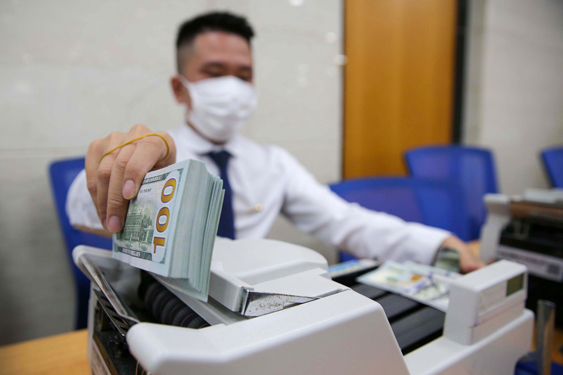
The deep decrease in exchange rate has a positive impact on many sectors and fields of the economy. Photo: HOANG TRIEU
According to records, the USD price at commercial banks has continuously decreased in recent days after falling below the 25,000 VND mark. According to banks, the USD price has plummeted in the context of the USD Index cooling down rapidly, currently at only 101.7 points - the lowest level since the beginning of this year - after the US Federal Reserve (FED) signaled its first interest rate cut at its policy meeting this September.
In the context of an abundant foreign exchange market, the State Treasury has announced its need to buy 100 million USD in foreign currency from commercial banks. Associate Professor, Dr. Nguyen Huu Huan, senior lecturer at the Ho Chi Minh City University of Economics, assessed that the State Treasury's move shows that the management agency is ready to buy USD to increase foreign exchange reserves, after a period of having to sell to intervene in the market.
Increasing foreign exchange reserves means pumping VND into the market, helping the USD/VND exchange rate not to decrease too quickly, avoiding affecting exports. "The State Bank of Vietnam is likely to continue buying foreign currency, creating more room to maintain a loose monetary policy and helping deposit interest rates not to increase too high" - Associate Professor, Dr. Huan commented.
Mr. Hoang Huy, a strategy analyst at Maybank Securities Company, said that after falling below the 25,000 VND/USD mark, the exchange rate has continuously remained below this level. Notably, the State Bank has responded early by proactively and flexibly managing the issuance of credit notes, reducing open market interest rates (OMO)... These factors aim to "take a shortcut" to the FED's interest rate cut signals (expected from 0.25 to 0.5 percentage points at the September meeting), opening up opportunities to reduce the interest rate level in the interbank market in the coming time. Thereby, creating room to cool down the mobilization interest rates among residents.
"The State Bank of Vietnam has issued a circular regarding the structure of official foreign exchange reserve investment and foreign currency trading between official foreign exchange reserves and the State budget. In particular, the State Treasury can buy foreign currency directly from the State Bank of Vietnam's foreign exchange reserves instead of having to buy directly from the market, thereby reducing pressure on the domestic exchange rate," Mr. Huy said.
Promote economic growth
Mr. Nguyen The Minh, Director of Analysis - Yuanta Vietnam Securities Company, commented that the new developments in exchange rates have brought many positive impacts to the domestic economy, especially reducing inflationary pressure, increasing domestic purchasing power and consolidating consumer confidence, contributing to promoting economic growth.
A cooling exchange rate is beneficial for attracting foreign investment, including foreign direct investment (FDI) and foreign indirect investment (FII). Because when the exchange rate is stable, foreign investors feel secure in investing.
For businesses, importers will benefit greatly from the fall in exchange rates, helping to reduce input costs. For exporters, in theory, they will be negatively affected by the fall in USD prices because goods are paid for in USD. However, the end of the US monetary policy tightening cycle to combat inflation will help some export industries to this market benefit indirectly due to expected improvements in consumer demand.
Notably, according to experts, the decrease in exchange rate will make interest rates "easier to breathe", especially in the context of banks trying to boost credit growth. According to Associate Professor, Dr. Nguyen Huu Huan, lending interest rates will not fluctuate too much compared to the present. Interest rates may increase at the end of the year when demand for loans is high, especially in the northern provinces that need capital for reconstruction and recovery after natural disasters. This demand will likely promote stronger credit growth.
Vietnam Export Import Bank (Eximbank) said it will continue to focus on promoting credit growth in the production and business sectors; processing and manufacturing industries; wholesale and retail; and essential consumption. Eximbank also promotes lending to individuals to buy houses for residence, receive land use rights to build houses, and does not invest in speculative real estate projects or sub-prime corporate bonds.
"Eximbank focuses on providing credit to production - business, import - export enterprises, small and medium enterprises, individual customers - lending to serve essential needs. Customers borrowing for production - business investment, essential consumption will be given priority in streamlined documents, quick processing time and the most preferential interest rates in the areas of capital use purposes" - Eximbank representative said.
Stocks benefit?
According to experts, if the FED lowers interest rates, it will not immediately impact Vietnam's monetary policy but will require a certain delay. In return, lower interest rates will have a positive impact on market sentiment, helping capital flows reverse from the US to emerging markets.
Associate Professor Dr. Nguyen Huu Huan analyzed that the Southeast Asian stock market is witnessing a return of foreign net buying. For example, in Indonesia, foreign net buying was $3 billion; in Thailand and the Philippines, the picture is also positive. As for the Vietnamese stock market, because the VN-Index is no longer priced attractively, it has not been able to reverse the foreign net selling trend.
Source: https://nld.com.vn/ti-gia-ha-nhiet-lai-suat-de-tho-196240912203512073.htm

















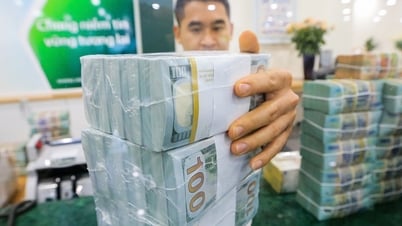


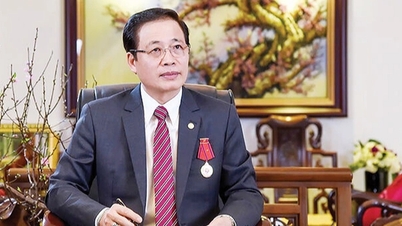













































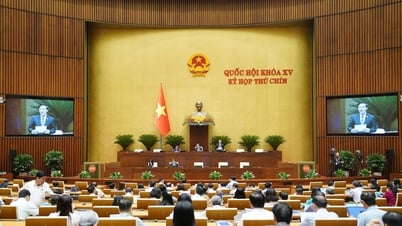












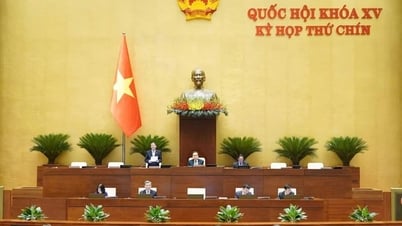









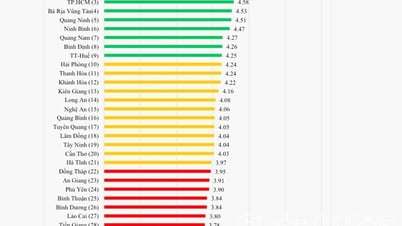

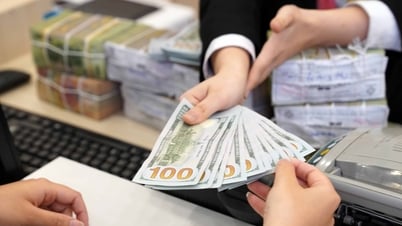










Comment (0)